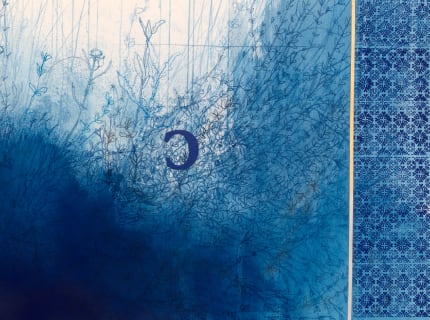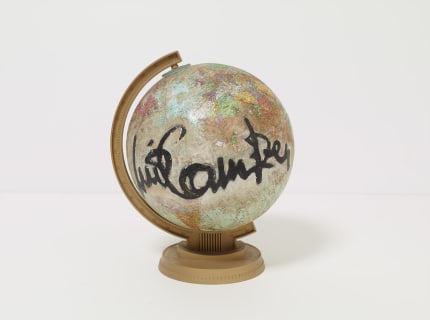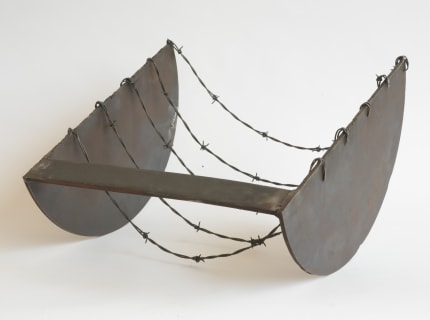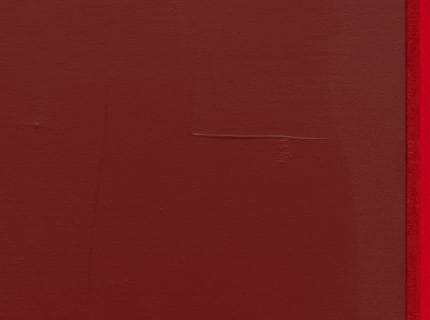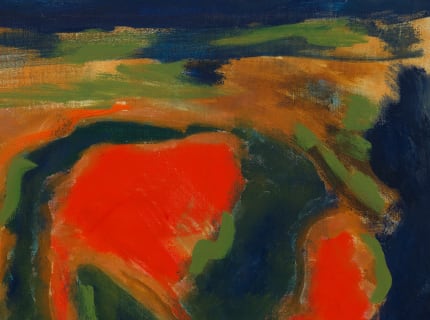"A sheet of paper casts a shadow."
Alexander Gray Associates, Germantown presents "A sheet of paper casts a shadow.” This group exhibition features a selection of works on paper by six Gallery artists, Ricardo Brey, Luis Camnitzer, Melvin Edwards, Harmony Hammond, Jennie C. Jones, and Betty Parsons. The show takes its title from a 1973 work by Camnitzer, Una hoja de papel echa una sombra. Mil hojas echan un libro de sombras. Adapting Camnitzer’s statement, “Una hoja de papel echa una sombra.” [“A sheet of paper casts a shadow.”], the exhibition explores the long conceptual and formal shadows cast by artists as they experiment with alternative forms of image-making.
Luis Camnitzer’s works from the 1970s like Una hoja de papel echa una sombra. Mil hojas echan un libro de sombras. investigate notions of originality and authorship, as well as the connection between language and action. Playing with these concepts, in Una hoja …, he invites viewers to construct their own associations tied to the work’s poetic assertion: “A sheet of paper casts a shadow. One thousand sheets of paper cast a book of shadows.” Elevating individual interpretation, Camnitzer’s lines recall his statement: “… [art is] the area where one can and should make ‘illicit’ connections, connections that are not allowed in disciplinary, fragmented thinking. Art illuminates them through questioning and allows (though not necessarily) for their possible affirmation after a critical and imaginative evaluation.”
Also illustrating this idea, Brey’s thoughtful drawings encourage viewers to make “‘illicit’ connections” through the disparate influences that inform their compositions. Drawing on everything from Deleuzian theory to botany to the cultural traditions of his native Cuba, Brey crafts compositions that critically reflect on contemporary society and humankind’s place in the world. In Windflowers Meadow (2021), he inscribes delicate floral motifs against a brilliant indigo background—its seemingly limitless expanse at once suggesting the ocean and the sky.
Similarly evocative, Betty Parsons’s abstract compositions like Islands (1960–1961) represent direct and often urgent interpretations of locales and experiences. Active and energetic—like Parsons, herself—these gouaches have a compelling immediacy, which is underscored by the playful fluidity of their formalism. In contrast to this fluidity, the four panels of Jennie C. Jones’s From a Score for Tenderness and Grace (2022) reimagine the rigid, linear geometry of the musical staff. Reorienting the five bars of this device and transforming it into a graphic element—one offset by rising and falling gestural streaks of acrylic—the work suggests crescendos and diminuendos, seamlessly translating a musical score into a visual experience. Like Jones’s score, Melvin Edwards’s 2016 untitled handmade paper work also adapts recognizable devices, constructing ominous—in the artist’s words—“shadows” from their forms. Featuring the foreboding outlines of chains, hooks, and other equally sinister implements, this 2016 piece and others like it recall the artist’s earlier works on paper from the 1970s, which employed silhouettes of materials and tools to reference the ongoing trauma of the African diaspora.
Also utilizing handmade paper, Harmony Hammond’s Extended Grid #1 (2017) subverts the modernist grid through ink traces and impressions that interrupt its reductive form. Alluding to buried layers, spaces, and histories, for Hammond, “It’s about what’s hidden, muffled, covered up or over, pushing up from underneath, asserting itself, suggesting agency and voice.”
Ultimately united by a shared commitment to challenging accepted formal strategies, Brey, Camnitzer, Edwards, Hammond, Jones, and Parsons construct works that insist on casting shadows by expanding viewers’ understandings of language, identity, and place. Together, the artists and artworks in "A sheet of paper casts a shadow.” recall Edwards’s assertion that when you play with shadows you play with “… visual possibilities.”


